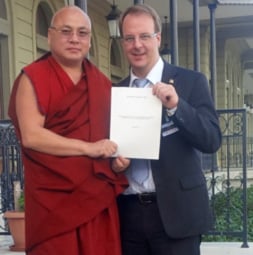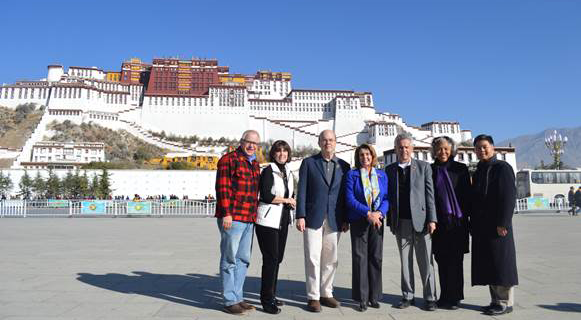UN-Committee against Torture underlines urgency of situation in Tibet

ICT’s Kai Müller and former Tibetan political prisoner Golog Jigme hold a copy of ICT’s submission to the Committee.
Members of US Congressional delegation hold press conference following historic visit to Tibet

Democratic Leader Nancy Pelosi and her delegation in front of the Potala in Lhasa, Tibet.
Democratic Leader Nancy Pelosi and Members of the Congressional Delegation who traveled to Tibet and China held a press conference on November 17, 2015 following their historic visit last week. Speaking about the trip, Representative Jim McGovern said:
Everywhere that Leader Pelosi or the delegation and I went in Tibet and Beijing, we talked about Tibet; we talked about His Holiness the Dalai Lama; we talked about human rights and the importance of respect for people’s culture and religion… We must find ways to build on this visit, and make the reforms needed for meaningful change, such as: one, allowing the United States to open a consulate in Lhasa, Tibet; two, allowing more Members of Congress, more journalists, more members of parliament from other nations, and more people in general – including Members of the Tibetan community here in the United States – to travel freely to Tibet; and three, renewing the dialogue with the Dalai Lama to resolve longstanding issues of Tibetan autonomy, religious practice, culture and heritage. I believe that His Holiness the Dalai Lama is part of the solution, not the problem, to resolving the issues confronting Tibetan autonomy.
Please click here to see a video of the press conference and a full transcript.
T.A.R. Communist Party boss speaks of establishing a “red line” in the anti-Dalai Lama struggle
Tibet’s Party boss has expressed his intent to extinguish loyalty to the Dalai Lama among Tibetan officials and prevent them from attending teachings in exile, as the importance of the “anti-separatist struggle” is emphasized at the highest levels in Beijing. “There will be severe punishments for Party members and cadres who follow the Dalai Clique, those who support infiltration and sabotage activities, those who leave the country to worship the 14th Dalai, participating in his ‘Buddhist teachings,’ listen to his sermons, and those who send their relatives and children to be educated in schools run by the 14th Dalai Clique,” Chen Quanguo said in a recent interview.
Tibetan Parliament gives condolences to French President following terror attack
“I was completely appalled by the barbaric acts of the terrorists in Paris that ended lives of hundreds of innocent people and condemn these acts in the strongest possible words,” Speaker Penpa Tsering wrote in a letter to French President Francois Hollande. He continued: “On behalf of Tibetan people inside and outside Tibet, we express our condolence to the families of the all those who lost their lives.”
Earlier in the week the Dalai Lama spoke to Deutsche Welle on the subject, saying:
We cannot solve this problem only through prayers. I am a Buddhist and I believe in praying. But humans have created this problem, and now we are asking God to solve it. It is illogical. God would say, solve it yourself because you created it in the first place.
We need a systematic approach to foster humanistic values, of oneness and harmony. If we start doing it now, there is hope that this century will be different from the previous one. It is in everybody’s interest. So let us work for peace within our families and society, and not expect help from God, Buddha or the governments.

